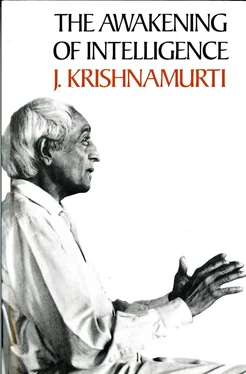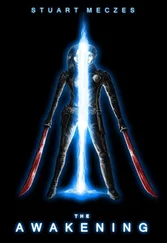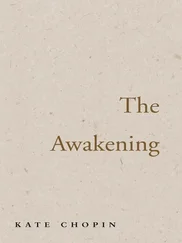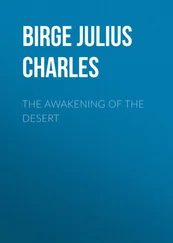KRISHNAMURTI: That’s simple. One also realises that to be free of will is to be free of this fragmentation.
Naudé: But religions in the world have always called upon will to come in and do something.
KRISHNAMURTI: Yes. But we are denying the whole of that.
Naudé: Yes.
KRISHNAMURTI: So what is a mind to do, or not to do, when it sees will is not the way, when it sees that one fragment taking charge over another fragment is still fragmentation and therefore conflict?—and therefore still within the field of misery. Then what is such a mind to do?
Naudé: Yes, this is really the question.
KRISHNAMURTI: Now, for such a mind is there anything to do?
Naudé: When you say that, one says, “If there is nothing to do then the circus goes on.”
KRISHNAMURTI: No, Sir. Look! The circus goes on only when there is the exercise of will.
Naudé: Are you saying that the circus that we have been discussing and trying to change, is in fact made up of will?
KRISHNAMURTI: My will against your will, and so on.
Naudé: My will against another part of me.
KRISHNAMURTI: And so on.
Naudé: My desire to smoke . . .
KRISHNAMURTI: That’s just it. A mind which starts by saying, “I must change,” realises that one fragment asserting it must change is still in conflict with another fragment, which is part of consciousness. It realises that. Therefore it also realises that will, to which man has become accustomed, which he takes for granted is the only way to bring about change . . .
Naudé: … is not the factor of change.
KRISHNAMURTI: Is not the factor of change. Therefore such a mind has come to quite a different height.
Naudé: It has cleared up a great deal.
KRISHNAMURTI: A vast quantity of rubbish.
Naudé: It has cleared up the division between the inner and the outer; the division between consciousness and its content. It has cleared up also the division between the conscious entity and the consciousness belonging to him and the various fragments. And it has cleared up the division between different fragments in that consciousness.
KRISHNAMURTI: So what has happened? What has happened to the mind that has seen all this? Not theoretically but actually felt it and says, “No more will in my life”. Which means no more resistance in my life.
Naudé: This is so extraordinary it is like finding the sky at the bottom, one day. It is such a great change, it is difficult to say what the extent of that change is.
KRISHNAMURTI: It has already taken place! That is my point.
Naudé: You are saying that there is no more will, there is no more effort, there is no more division between the outside and the inside . . .
KRISHNAMURTI: … no more fragmentation within consciousness.
Naudé: No more fragmentation.
KRISHNAMURTI: That is very important to understand, Sir.
Naudé: No more observer separate from what he has observed.
KRISHNAMURTI: Which means what? No fragmentation within consciousness. Which means consciousness only exists when there is conflict between fragments.
Naudé: I am not sure that I have understood that. Consciousness is its fragments?
KRISHNAMURTI: Consciousness is its fragments and consciousness is the battle between the fragments.
Naudé: Are you saying that there are only fragments because they are in conflict, in battle? When they are not battling together they are not fragments, because they are not acting as parts. The acting of one part on another ceases. That is what it means when you say fragmentation. That is what fragmentation is.
KRISHNAMURTI: See what has taken place!
Naudé: The fragments disappear when they are not acting against each other.
KRISHNAMURTI: Naturally! When Pakistan and India . . .
Naudé: . . . are no longer fighting, there is no more Pakistan and India.
KRISHNAMURTI: Naturally.
Naudé: Are you saying that that is the change?
KRISHNAMURTI: Wait, I don’t know yet. We’ll go into it. A human mind has realised that the world is “me” and I am the world, my consciousness is the consciousness of the world, and the world’s consciousness is me. The content of consciousness with all its miseries and so on is consciousness. And within that consciousness there are a thousand fragmentations. One fragment of those many fragments becomes the authority, the censor, the observer, the examiner, the thinker.
Naudé: The boss.
KRISHNAMURTI: The boss. And so he maintains fragmentation. See the importance of this! The moment he assumes the authority, he must maintain fragmentation.
Naudé: Yes, obviously. Because it is a part of consciousness acting on the rest of consciousness.
KRISHNAMURTI: Therefore he must maintain conflict. And conflict is consciousness.
Naudé: You have said that the fragments are consciousness; and are you now saying that the fragments are in fact the content?
KRISHNAMURTI: Of course.
Naudé: Fragments are conflict. There is no fragment without conflict?
KRISHNAMURTI: When is consciousness active?
Naudé: When it is in conflict.
KRISHNAMURTI: Obviously. Otherwise there is freedom, freedom to observe. So radical revolution in consciousness, and of consciousness, takes place when there is no conflict at all.
MALIBU, CALIFORNIA
27 MARCH 1971
__________________
1Alain Naudé, musician, for six years closely associated with Krishnamurti as his secretary and assistant, and (as he says) above all as his student. At present living in the U.S.A.
2
ON GOOD AND EVIL
Conversation between J. Krishnamurtiand Alain Naudé
Naudé: Do good and evil really exist, or are they simply conditioned points of view? Is there such a thing as evil and if so what is it? Is there such a thing as sin? And is there such a thing as goodness? And what is it to be really and deeply good?
KRISHNAMURTI: I was thinking this morning on the same theme as your questions imply, whether there is an absolute good and absolute evil: as the Christian idea of sin and the Asiatic idea of Karma—as action which breeds more misery and more sorrow and yet out of that conflict of sorrow and pain a goodness is born. I was thinking about it the other day when I saw on the television some men killing baby seals. It is a terrible thing, I turned my head away quickly. Killing has always been wrong, not only human beings but animals. And religious people, not the people who believe in religion, but the really religious mind, has always shunned every form of killing. Of course, when you eat a vegetable you are killing—a vegetable—but that is the least form of killing and the simplest form of survival: I wouldn’t call that killing. One has watched in India, in Europe, and in America the acceptance of killing in war, in organised murder, which war is. Also “killing” people with words, with a gesture, with a look, with contempt: this form of killing has also been decried by religious people. But in spite of it all, killing has been going on—killing, violence, brutality, arrogance, aggressiveness—all ultimately leading, in action or in thought, to hurting, to brutalising others. Also one has seen those ancient caves in North Africa and in the South of France where man is shown fighting animals, where perhaps fighting evil is understood. Or is it fighting as a form of amusement, to kill something, to overcome? So when one looks at all this, one asks if there is such a thing as evil in itself, totally devoid of the good; and what is the distance between evil and good. Is evil the diminution of good, slowly ending in evil? Or is good the diminution of evil, gradually becoming good? That is, through the time interval, moving from goodness to evil, and from evil to good?
Читать дальше












